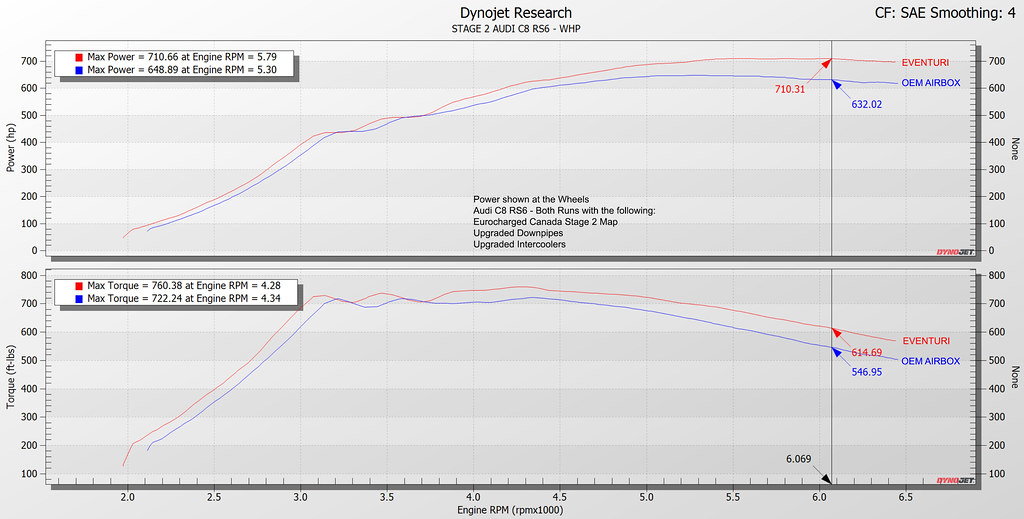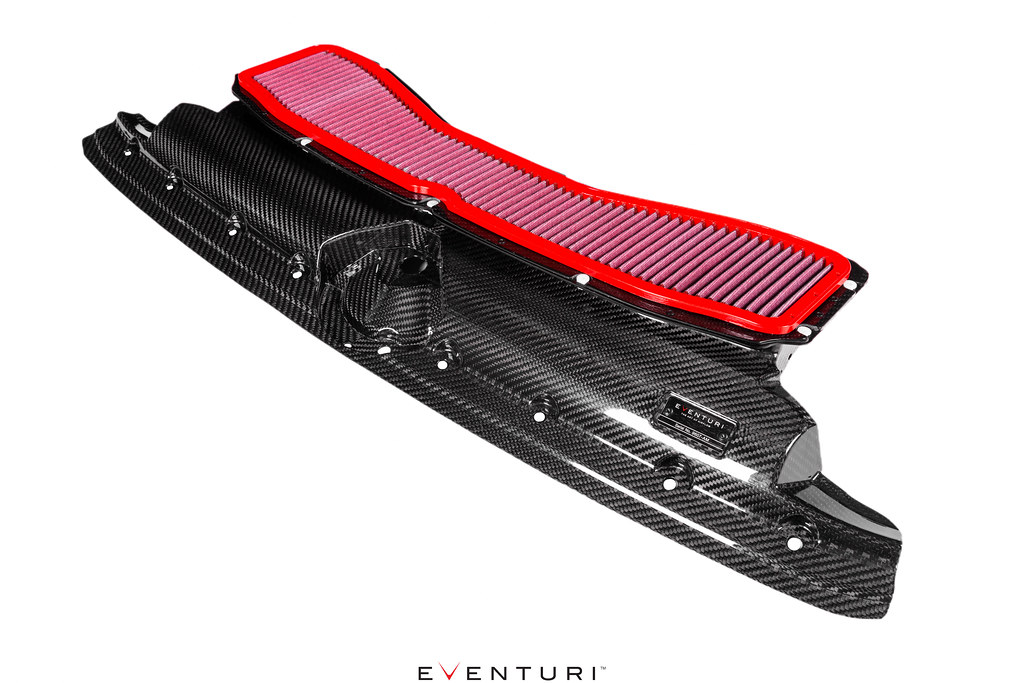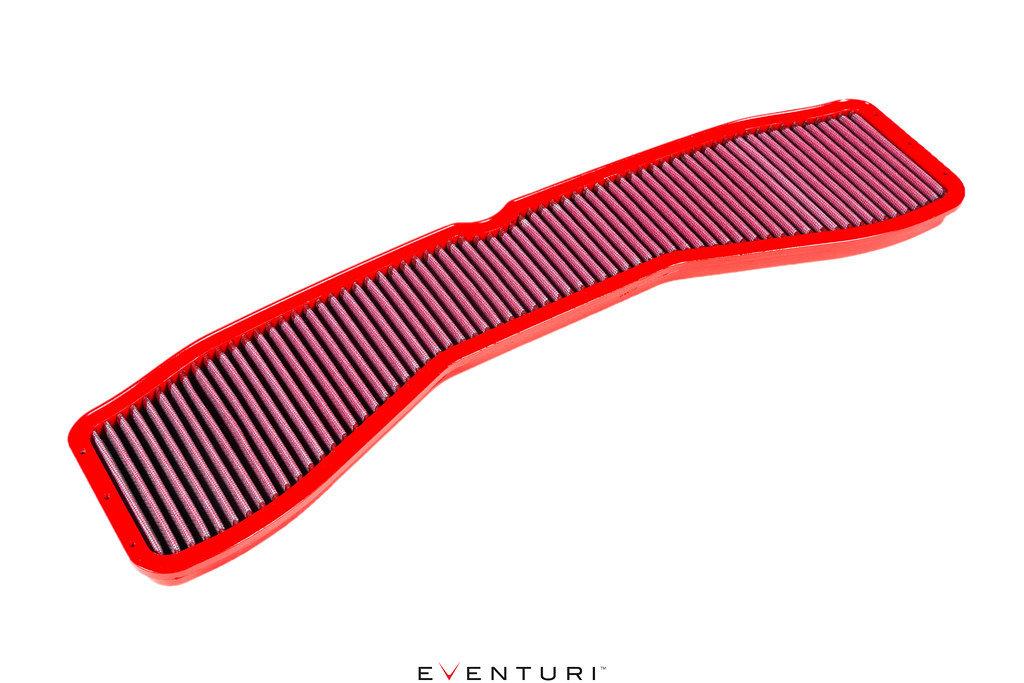AUDI C8 RS6 RS7
Performance Increase – Stock ECU : 15-25hp, 11-20ft-lbs
Performance Increase – Stage 1* : 45-50hp, 40-45ft-lbs
Stage 1 Acceleration 100-200Km/h : Reduced by 0.6s
Performance Increase – Stage 2* : 60-80hp, 60-70ft-lbs
*Some images show our optional carbon engine cover.
The Audi C8 RS6 intake system is the culmination of extensive development, testing and prototyping. Our aim was to address 2 main criteria: 1) Increased flow rate. 2) Smooth Airflow. The first objective was met by utilising all of the limited space available in the RS6 engine bay which was heavily restricted by the underside of the hood. Our solution was to completely redesign the entire airbox which maximised volume, increased flow entry openings and created a more favourable filter angle to the turbos. Furthermore we dramatically increased the size of the turbo inlets by as much as 85% when measuring the cross sectional area at the openings. The second objective was met by designing an organically shaped system with a custom rounded panel filter to ensure the airflow path contained no sharp corners and therefore allowed for the flow to remain laminar. With smooth transitions from the filter to the turbo inlets, our intake minimises the formation of turbulence and therefore the turbos are able to operate more efficiently. We partnered with BMC for a bespoke filter element to ensure that the filtration area is as large as possible whilst keeping airflow clean.
With all objectives met, our C8 RS6 intake system delivers on all fronts and allows for the turbos to generate boost more efficiently. This results in an improved throttle response and significant power gains, independently tested which increase with higher states of tune. The performance gains measured are a result of the complete system we have developed from the airbox base to the lid and the inlets.
*Gains measured can vary with different ECU tunes.
DYNO TESTING
Our intake has been independently tested both on the dyno and on the road. With higher states of tune the turbos demand more air and therefore the stock airbox becomes a bigger restriction. Here are some results from respected tuners who have tested the intake.
STOCK ECU TESTING
Dyno testing was carried out by Awesome GTI in the UK on their own C8 RS6 equipped with an aftermarket OPF back exhaust. They tested the car with the stock map and also their own stage 1 remap. They ran the car 4 times in 4th gear with the stock airbox and then swapped over to the Eventuri while the car remained on the dyno. The car was then run again in 4th gear 4 times. Testing was all done on the same day and no other changes were made. The graph below shows the highest power from the stock airbox vs highest power run from the Eventuri intake. Both were the first dyno pulls with subsequent pulls reducing in power due to heat soak. As can be seen below the intake provides a significant gain in performance throughout the RPM range with the stock map and more so with the stage 1 remap. The highlighted point shows the highest gain in the RPM range of 23hp at the wheels.

STAGE 1 TESTING
Here are the results from the Awesome GTI Stage 1 remap. Both runs had the same map with only the intake being swapped between runs. Again - they ran the car 4 times in 4th gear with the stock airbox and then swapped over to the Eventuri while the car remained on the dyno. The highlighted point shows the highest gain in the RPM range of 60hp at the wheels. The resulting gains are noticeable on the road with better throttle response and improved acceleration times.

STAGE 2 TESTING
Dyno testing on a stage 2 RS6 was carried out by Eurocharged Canada on a car with aftermarket downpipes, intercoolers and their own stage 2 remap. Figures here are shown at the wheel. They ran the car multiple times with both the stock airbox and the Eventuri with the resulting figures shown below after taking the best stock vs the best Eventuri results. Again we can see a dramatic increase in power and since this is at stage 2 levels, the stock airbox is an even bigger restriction. The highlighted point shows the highest gain in the RPM range of 79hp at the wheels.

DRAG STRIP TESTING
We took a stage 1 RS6 to a local drag strip to measure the effect of the intake on quarter mile times and also on 100-200km/h times. The car ran 3 times on the stock airbox to get a repeatable result and then the intake was swapped over to the Eventuri. The car was then again run 3 times to make sure the result was consistent. Results are:
- QUARTER MILE
- Stock Airbox 11.2s at 126mph
- Eventuri 10.75s at 129mph
- .
- 100-200km/h
- Stock Airbox 7.46s
- Eventuri 6.90s

FLOW BENCH TESTING
Flow rate tests were conducted using a Superflow SF-1020 to measure the maximum flow rate possible at a pressure drop of 28” H2O. Tests were done on the same day in controlled conditions using the same test jig for each system. We tested the turbo inlets by themselves and then also the complete assembly with the airbox and turbo inlets together for both the stock system and the Eventuri.
Testing just the inlets alone shows a 58% increase in flow rate over stock. This is due to the way our inlets increase in diameter at the airbox side which allows for a much lower restriction. Testing the complete system with the airbox shows an increase in flow rate of 90% over stock which is a significant increase. This shows just how restrictive the stock airbox is, with the flow rate dropping by over 25% when adding the stock airbox to the stock inlets. In contrast the flow rate drops by only 11% when adding the Eventuri intake to the Eventuri inlets. With a 90% increase in flow rate, it is clear why there are significant power gains once the C8 RS6 is tuned and the turbos demand a higher flow to create more boost pressure.



Part Numbers:
-
EVE-C8RS6-CF-INT : Audi C8 RS6/RS7 Intake GLOSS carbon
-
EVE-C8RS6-CFM-INT : Audi C8 RS6/RS7 Intake MATTE carbon

Each intake system consists of:
- Carbon Fiber Airbox Base
- Carbon Fiber Airbox Lid
- Bespoke BMC Panel Filter
- Enlarged Turbo Inlets with CNC machined reinforcement
- Custom Silicon Hoses with OEM Specification Clamps
- Custom Made Hardware

LOWER AIRBOX

We have completely redesigned the entire airbox system including the base which the filter sits inside. We have combined the slam panel with the lower airbox and increased the volume of this area to help increase the total flow rate. Furthermore, the base has been designed to allow the filter to sit at a more favourable angle to the turbo inlets. Where the stock airbox has a 90 degrees turn from the filter to the inlets, our airbox has a less abrupt angle and this allows for a smoother flow path.

AIRBOX LID

During development we designed and tested 4 different designs for the lid and test results showed that V2 was the highest performing. This design was optimised with CFD simulations and provides a smooth flow path from the filter to the inlets. Our design has an increased volume in comparison to the stock lid and is more organically shaped with smoother curves as opposed to the stock lid which is very cuboid. Furthermore the openings to the turbo inlets have been significantly increased in size.



TURBO INLETS

The inlets have been increased in size at the airbox side by as much as 85% more than the stock inlets and smoothly taper down to the stock turbos. This increased size significantly reduces the drag in the turbos and therefore allows them to work more efficiently. We have also incorporated CNC machined bushes and rings in the inlets for structural strength. For cars with hybrid turbos, we also have separate inlets available on request to match the different inlet diameters.

BESPOKE BMC FILTER

Our airbox required a bespoke panel filter and for this we collaborated with BMC who have developed their iconic filter specifically for our system. It is a washable 4-layer cotton mesh filter which provides superior filtration while maintaining a low pressure drop.

The complete intake system comes together to provide a superior airbox which allows the turbos to reach target boost levels much sooner and therefore the engine is able to produce more power earlier in the RPM range. When combined with a tune where the boost levels are increased, our airbox provides the required de-restricted flow path for the turbos to achieve elevated boost pressures.
